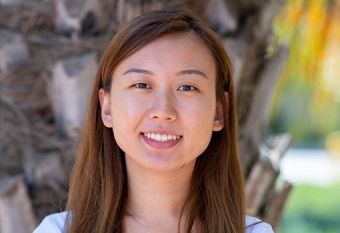
Chemical engineering faculty have awarded Yaxin (Starry) Xu the department’s top honor for a rising third-year PhD student, the prestigious Dow Discovery Fellowship. The department awards one fellowship each year to a student who has made outstanding strides in research and presents a compelling plan for a creative new high-risk, high-reward project.
“I am honored to have been selected for the Dow Discovery Fellowship, especially knowing the impressive research done by my colleagues,” said Xu, who is advised by chemical engineering assistant professor Sho Takatori. “This fellowship is an extraordinary recognition of my personal and professional journey. I am very thankful for those who have supported me throughout my journey, including my advisor, Professor Takatori, the members of my dissertation committee, my graduate student peers, and the department. This award enables me to pursue the diverse, high-risk directions of my research with much more intellectual freedom and creativity.”
The Takatori lab combines theory and computation with experiments to better understand and engineer soft materials having unusual physical properties. The group studies the nonequilibrium statistical mechanics and fluid dynamics of soft materials. Takatori said that Xu, who earned a bachelor’s degree in chemical engineering from Caltech and minored in English, joined his lab as an expert in structural biology with no prior research experience in theoretical and computational fluid mechanics, which has become the focus of Xu’s thesis. But in just over a year, he says, Xu has mastered the skills required to make big advances in soft materials theory and simulations.
“I learned quickly that Starry is not an ordinary student. She has a fearless attitude toward tackling new and unexplored scientific areas, and seems to have no issues deviating from her comfort zone,” said Takatori. “Her PhD trajectory truly embodies the spirt of the Dow Discovery Fellowship, a fellowship that is awarded to support brave and fearless PhD students. For creative and pioneering students like Starry, you just have to get out of their way and let them pursue their scientific passion.”
The fellowship will enable Xu to develop theoretical frameworks for understanding the complex dynamics and interactions among colloidal particles, which are small particles suspended in fluid. She plans to study particles exhibiting unusual time-dependent interactions arising from surface species tethered to the particle interfaces. Examples of such a system include fluid emulsions stabilized by polymeric surfactants, and mammalian cells having proteins tethered to the cell membrane. The particles interact in unusual ways because the surface species, present at contact interfaces, can relax and dynamically alter their effective interactions.
“Colloidal particles are very suitable building blocks for self-assembly processes, but they can often jam and arrest into disordered, nonequilibrium structures because we lack control over the timescales of their interactions,” explained Xu. “My research is focused on finding a way to achieve precise timescale control by exploring the concept of surface mobility.”
The work is inspired by the surfaces of biological cells, where proteins are anchored to an underlying phospholipid bilayer and can diffuse laterally along the cell membrane. Xu hopes to regulate the interaction time scales in a synthetic colloidal system by controlling the diffusion of macromolecules that are bound to colloidal surfaces, and, thus, influencing the interfacial dynamics between colloidal particles.
“We hope our novel technique will generate new soft materials with exquisite mechanistic and predictive control over their material and transport properties,” said Xu.
The findings from her project have the potential to affect broad areas in science and technology, from consumer products to biotechnology.
“This project is a challenging multiscale problem that requires a deep understanding of fluid dynamics, statistical mechanics, and advanced numerical techniques,” explained Takatori. “The Dow Fellowship will enable Starry to continue to display her creativity with complete intellectual freedom.”
The fellowship is made possible by a generous contribution from the Dow Chemical Company. The three-year, $150,000 fellowship is designed to support students over the remaining three years of their graduate work. Previous Dow Discovery Fellowship recipients include Preshit Dandekar, Nikolai Petsev, Richard Hermann, St. Elmo Wilken, Nick Sherck, and Parth Shah.



